Paradise Lost 失乐园逐句解析
- 格式:pptx
- 大小:181.59 KB
- 文档页数:14
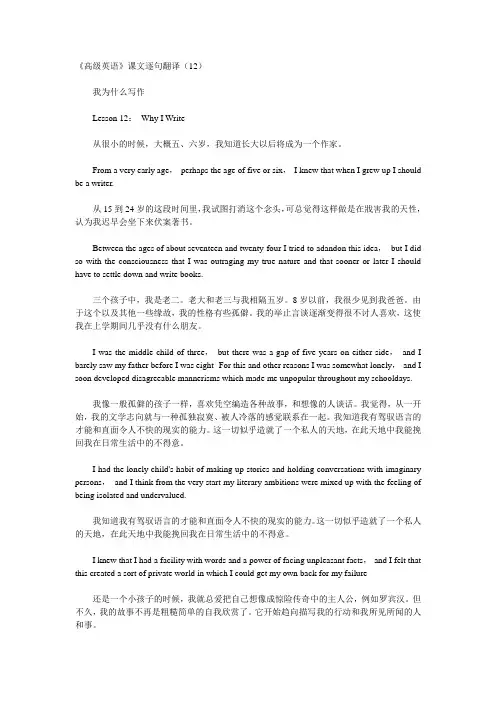
《高级英语》课文逐句翻译(12)我为什么写作Lesson 12:Why I Write从很小的时候,大概五、六岁,我知道长大以后将成为一个作家。
From a very early age,perhaps the age of five or six,I knew that when I grew up I should be a writer.从15到24岁的这段时间里,我试图打消这个念头,可总觉得这样做是在戕害我的天性,认为我迟早会坐下来伏案著书。
Between the ages of about seventeen and twenty-four I tried to adandon this idea,but I did so with the consciousness that I was outraging my true nature and that sooner or later I should have to settle down and write books.三个孩子中,我是老二。
老大和老三与我相隔五岁。
8岁以前,我很少见到我爸爸。
由于这个以及其他一些缘故,我的性格有些孤僻。
我的举止言谈逐渐变得很不讨人喜欢,这使我在上学期间几乎没有什么朋友。
I was the middle child of three,but there was a gap of five years on either side,and I barely saw my father before I was eight- For this and other reasons I was somewhat lonely,and I soon developed disagreeable mannerisms which made me unpopular throughout my schooldays.我像一般孤僻的孩子一样,喜欢凭空编造各种故事,和想像的人谈话。
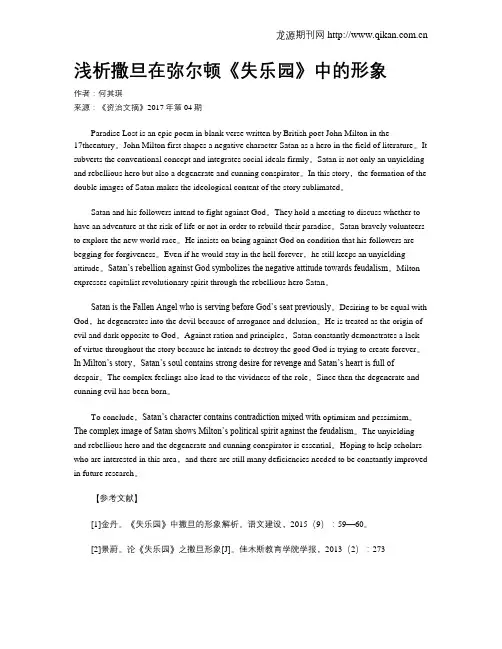
龙源期刊网 浅析撒旦在弥尔顿《失乐园》中的形象作者:何其琪来源:《资治文摘》2017年第04期Paradise Lost is an epic poem in blank verse written by British poet John Milton in the17thcentury。
John Milton first shapes a negative character Satan as a hero in the field of literature。
It subverts the conventional concept and integrates social ideals firmly。
Satan is not only an unyielding and rebellious hero but also a degenerate and cunning conspirator。
In this story,the formation of the double images of Satan makes the ideological content of the story sublimated。
Satan and his followers intend to fight against God。
They hold a meeting to discuss whether to have an adventure at the risk of life or not in order to rebuild their paradise。
Satan bravely volunteers to explore the new world race。
He insists on being against God on condition that his followers are begging for forgiveness。

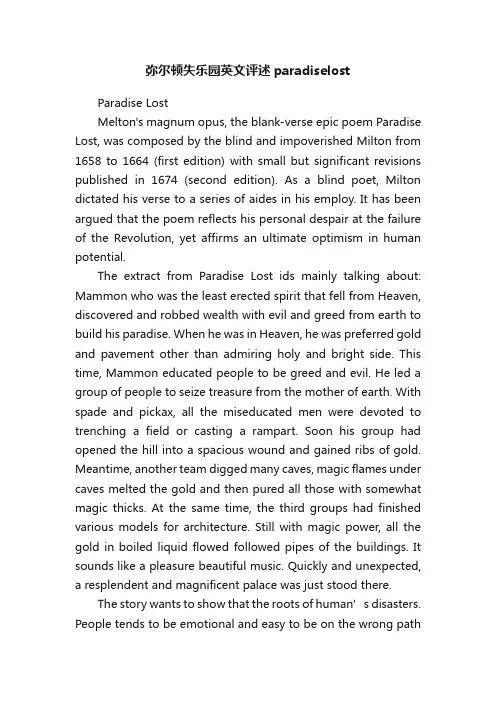
弥尔顿失乐园英文评述paradiselostParadise LostMelton's magnum opus, the blank-verse epic poem Paradise Lost, was composed by the blind and impoverished Milton from 1658 to 1664 (first edition) with small but significant revisions published in 1674 (second edition). As a blind poet, Milton dictated his verse to a series of aides in his employ. It has been argued that the poem reflects his personal despair at the failure of the Revolution, yet affirms an ultimate optimism in human potential.The extract from Paradise Lost ids mainly talking about: Mammon who was the least erected spirit that fell from Heaven, discovered and robbed wealth with evil and greed from earth to build his paradise. When he was in Heaven, he was preferred gold and pavement other than admiring holy and bright side. This time, Mammon educated people to be greed and evil. He led a group of people to seize treasure from the mother of earth. With spade and pickax, all the miseducated men were devoted to trenching a field or casting a rampart. Soon his group had opened the hill into a spacious wound and gained ribs of gold. Meantime, another team digged many caves, magic flames under caves melted the gold and then pured all those with somewhat magic thicks. At the same time, the third groups had finished various models for architecture. Still with magic power, all the gold in boiled liquid flowed followed pipes of the buildings. It sounds like a pleasure beautiful music. Quickly and unexpected, a resplendent and magnificent palace was just stood there.The story wants to show that the roots of human’s disasters. People tends to be emotional and easy to be on the wrong pathdue to lack of rational, strong will. That’s why people would always break regulations when influenced by various factors from the outside of the world. So is paradise lost. The author criticised those attitude and ill-mind. He affirmed people’s gumption, negated infinite hedonism. And also he affirmed people’s sens e of pride, negated the breeding pride and ambition. Just like the least erected spirit Mammon, he was too evil and greedy, and mislead the delicate human to be the same ones. They destroyed the earth, plundered the wealth resources of earth. All these com from their easily broken will. People there build up the resplendent and magnificent palace, hoping eternally lived in easy and comfortable without worries and danger.In the extract of Paradise Lost, Milton shows excellent means of artistic expression. Dazzling and lyric figure of speech. Such as veins of liquid fire, as in an organ from one blast of wind, rose like an exholatior, or build like a temple. He also use the manner in which Latin is used in speaking or writing. Furthermore,he used canorous tone which expressed the sweet of tonality. For example, too many arow of pipes the sound-board breathes anon out of the earth a fabric huge of dulcet symphonies and voices sweet. There is also a part of argument by Milton in the extract, let none admire that riches grow in hell. That soil may bestdeserve the precious bane. And here let those who boast in mortal things, and wondering tell of Babel, and the works of Memphian kings. Learn how their greatest monuments of fame, and strength, and art, are easily out-done by spirits reprobate, and in an hour what in an age they with incessant toil and hands innumerable scarce perform.Features of Milton’s works.(1) Milton is one of the very few truly great English writers who is also a prominent figure in politics, and who is both a great poet and an important prose writer. The two most essential things to be remembered about him are his Puritanism and his republicanism.(2) Milton wrote many different types of poetry. He is especially a great master of blank verse. He learned much from Shakespeare and first used blank verse in non-dramatic works.(3) Milton is a great stylist. He is famous for his grand style noted for its dignity and polish, which is the result of his life-long classical and biblical study.(4) Milton has always been admired for his sublimit of thought and majesty of expression.。
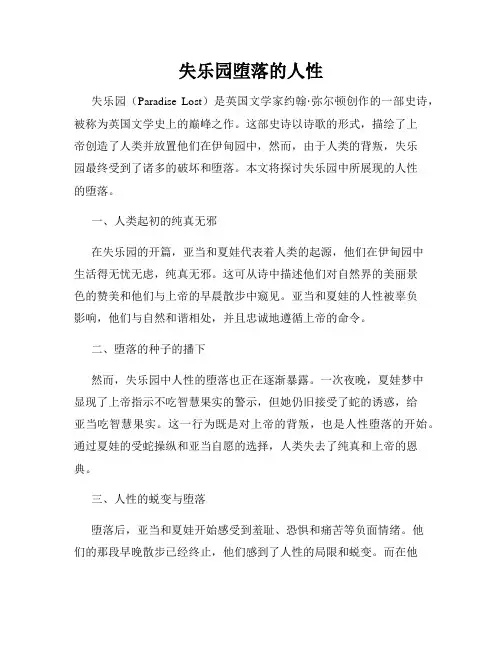
失乐园堕落的人性失乐园(Paradise Lost)是英国文学家约翰·弥尔顿创作的一部史诗,被称为英国文学史上的巅峰之作。
这部史诗以诗歌的形式,描绘了上帝创造了人类并放置他们在伊甸园中,然而,由于人类的背叛,失乐园最终受到了诸多的破坏和堕落。
本文将探讨失乐园中所展现的人性的堕落。
一、人类起初的纯真无邪在失乐园的开篇,亚当和夏娃代表着人类的起源,他们在伊甸园中生活得无忧无虑,纯真无邪。
这可从诗中描述他们对自然界的美丽景色的赞美和他们与上帝的早晨散步中窥见。
亚当和夏娃的人性被辜负影响,他们与自然和谐相处,并且忠诚地遵循上帝的命令。
二、堕落的种子的播下然而,失乐园中人性的堕落也正在逐渐暴露。
一次夜晚,夏娃梦中显现了上帝指示不吃智慧果实的警示,但她仍旧接受了蛇的诱惑,给亚当吃智慧果实。
这一行为既是对上帝的背叛,也是人性堕落的开始。
通过夏娃的受蛇操纵和亚当自愿的选择,人类失去了纯真和上帝的恩典。
三、人性的蜕变与堕落堕落后,亚当和夏娃开始感受到羞耻、恐惧和痛苦等负面情绪。
他们的那段早晚散步已经终止,他们感到了人性的局限和蜕变。
而在他们被驱逐出伊甸园之后,他们必须在外面的世界里工作和生活,饱受人类生活中的辛苦。
四、诱使堕落的势力在失乐园中,堕落的人性不仅是由人类主动选择,也受到了一些外在力量的影响。
其中,蛇作为撒旦的化身之一,是夏娃堕落的关键人物之一。
蛇以诱人的语言,诱使夏娃去吃智慧果实,从而破坏了她与上帝的纯洁的关系。
同时,撒旦的诱惑和欺骗也离不开人类的贪婪和虚荣心。
五、对堕落的思考弥尔顿通过描述夏娃与亚当的堕落,让读者对人性的堕落产生了思考。
人类的叛逆和背叛,成为了人性堕落的起因。
在诗中,弥尔顿试图探讨人性是否永远受到堕落的束缚,亚当和夏娃的错误是否能得到原谅。
六、堕落后的积极思考尽管失乐园中描述了人性的堕落,但同时也有积极的思考。
弥尔顿通过亚当和夏娃的反思和忏悔,揭示了人类在经历堕落后寻求救赎和重新获得上帝恩典的可能性。
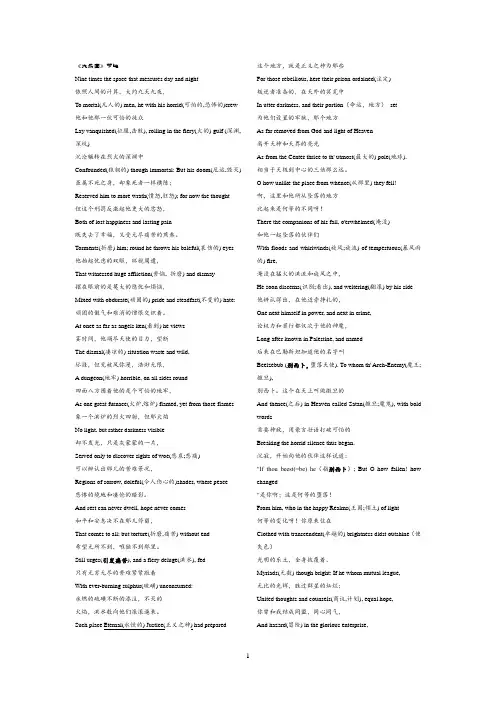
《失乐园》节选Nine times the space that measures day and night依照人间的计算,大约九天九夜,To mortal(凡人的) men, he with his horrid(可怕的,恐怖的)crew 他和他那一伙可怕的徒众Lay vanquished(征服,击败), rolling in the fiery(火的) gulf (深渊,深坑)沉沦辗转在烈火的深渊中Confounded(狼狈的) though immortal: But his doom(厄运,毁灭) 虽属不死之身,却象死者一样横陈;Reserved him to more wrath(愤怒,狂怒); for now the thought但这个刑罚反激起他更大的忿怒,Both of lost happiness and lasting pain既失去了幸福,又受无尽痛苦的煎熬。
Torments(折磨) him; round he throws his baleful(哀伤的) eyes他抬起忧虑的双眼,环视周遭,That witnessed huge affliction(苦恼, 折磨) and dismay摆在眼前的是莫大的隐忧和烦恼,Mixed with obdurate(顽固的) pride and steadfast(不变的) hate: 顽固的傲气和难消的憎恨交织着。
At once as far as angels ken(看到) he views霎时间,他竭尽天使的目力,望断The dismal(凄凉的) situation waste and wild,际涯,但见被风弥漫,浩渺无限,A dungeon(地牢) horrible, on all sides round四面八方围着他的是个可怕的地牢,As one great furnace(火炉,熔炉) flamed, yet from those flames象一个洪炉的烈火四射,但那火焰No light, but rather darkness visible却不发光,只是灰蒙蒙的一片,Served only to discover sights of woe(悲哀;悲痛)可以辨认出那儿的苦难景况,Regions of sorrow, doleful(令人伤心的)shades, where peace悲惨的境地和凄怆的暗影。
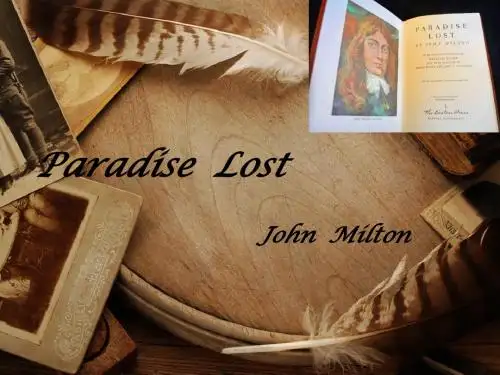
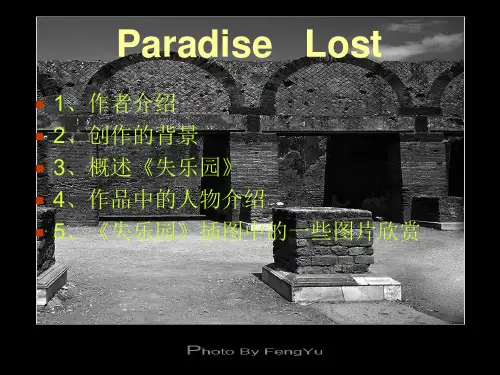
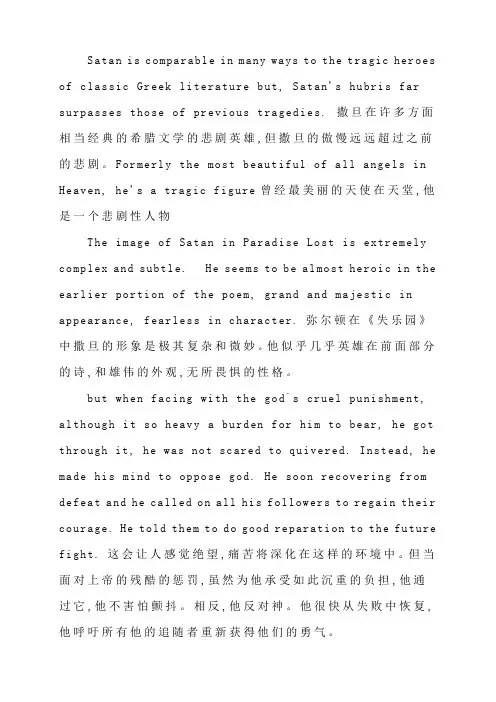
Satan is comparable in many ways to the tragic heroes of classic Greek literature but, Satan's hubris far surpasses those of previous tragedies. 撒旦在许多方面相当经典的希腊文学的悲剧英雄,但撒旦的傲慢远远超过之前的悲剧。
Formerly the most beautiful of all angels in Heaven, he's a tragic figure曾经最美丽的天使在天堂,他是一个悲剧性人物The image of Satan in Paradise Lost is extremely complex and subtle. He seems to be almost heroic in the earlier portion of the poem, grand and majestic in appearance, fearless in character. 弥尔顿在《失乐园》中撒旦的形象是极其复杂和微妙。
他似乎几乎英雄在前面部分的诗,和雄伟的外观,无所畏惧的性格。
but when facing with the god`s cruel punishment, although it so heavy a burden for him to bear, he got through it, he was not scared to quivered. Instead, he made his mind to oppose god. He soon recovering from defeat and he called on all his followers to regain their courage. He told them to do good reparation to the future fight. 这会让人感觉绝望,痛苦将深化在这样的环境中。


《失乐园》是英国政治家、学者约翰·弥尔顿创作的史诗,以宏大的叙述、深刻的哲学思想、丰富的幻想元素、复杂的情节以及优美的音韵和音乐式语调,展现了人类历史和宇宙观念的壮丽画卷。
在《失乐园》中,弥尔顿以撒旦的反抗和最终失败的情节为主线,将人类的堕落与救赎、自由意志与罪恶等主题紧密相连,深刻探讨了人类命运的复杂性和宇宙间正反相对、相互矛盾的两种势力的存在。
作品中的主要人物形象鲜明,包括上帝、撒旦、亚当和夏娃等,他们各自代表着不同的哲学观念和宗教信仰。
在神话符号的角度上,《失乐园》展示了一个充满神秘和象征意义的世界。
例如,作品中的许多符号和象征,如知识树、蛇、天使等,都具有深刻的哲学意义和启示作用。
这些符号和象征使得作品更加深邃、富有哲学意义。
在宗教哲学角度上,《失乐园》主要主题是失乐园,它是对长久以来关于上帝、人类、自由意志和罪恶的辩论的哲学回应。
作品展示了人类失去天堂的悲剧,同时也揭示了人类命运的复杂性和宇宙间正反相对、相互矛盾的两种势力的存在。
总的来说,《失乐园》是一部具有深刻哲学意义和启示作用的史诗。
通过对人类历史和宇宙观念的描述,作品展现了人类命运的复杂性和宇宙间正反相对、相互矛盾的两种势力的存在。
同时,作品也启示人们要珍惜自由意志和知识,追求真理和正义,以实现人类的救赎和自我超越。
英国文学——简析《失乐园》A Brief Analysis of Paradise LostCreated as children of God, Adam and Eve lived happily in the Garden of Eden. They owed the paradise, as well as got incomparable rights and enjoyed unrivalled happiness. In the paradise, they named kinds of bionts and made friends with them. All senses seem perfect, until Satan was appeared and prevailed on Eve to pick the forbidden fruit.Be tempted to eat the forbidden fruit, we considered it as degeneration ,Adam and Eve had made human's pardoned crime, in terms of that, it is an “inevitable and enticing”incident actually. Then I’ll make a brief analysis of the Paradise Lost.For Adam and Eve:Described as the most powerful creatures in the world, Adam had the ability to labor and got corresponding harvest, as well as absolute rights in his paradise except the tree of knowledge. But he was a bit greedy, he felt lonely and implored God created a fere for him, therefore Eve was born. Eve wa s created by Adam’s rib, she was destined to be dominated by Adam, or we can say, woman is birth to be dominated by man, this is , in my opinion, one of what writer want to say, but it is less important. Adam and Eve ate delicious fruit and owed sheer freedom, they could have lived carefree, but they were unable to immune to the temptation and finally ate the apple .What’s a pity!As son of God, Adam was once pride of him and gained full affection from him. Just because of that, God created a woman called Eve to accompany with Adam. They loved each other and shared all things ---this was the reason that why Adam finally atethe forbidden fruit. After that, they possessed wisdom and quickly realize what they like actually! They felt ashamed because of their nude, and tried to find the way to disguise themselves. Then Adam and Eve were punished by God and driven out the Paradise. At last, , human's degeneration came in.The humanity has created the civilization because of the display wisdom; and got the curse because of abused the wisdom. The fertile soil grown into the thorn, green wilderness became wilderness, the sunny sky became something fishy, limpid rivers drifted sewages. If human nature was impacted evilly, it’ll cause fearful consequence--the destruction. Human beings may lost the right to get eternal life (grows continually), on the contrary, human is stem from the dust, thenhe will regress in the dust. This is an ancient but ever new alarm bell.For Satan:Satan is identified as heinousness chronica lly in people’s eyes. At the beginning, he was the most prestigious angel and possessed incomparable strength. As time goes by, he felt the hypocrisy and dictatorship among angels. In order to change the status, he decided to revolt. He is a negative character in the poem, but at the same time, he is also a warrior, who dare to resist unfair treatment. True, he is treacherous to trick Eve to pick the forbidden fruit and lead human’s degeneration, I think he is a a fierce and powerful person, just like Cao Cao in Romance of the Three Kingdoms. Though his resist was failed, he was not given up insist on fighting until he was exterminated.Satan is a tragic character in the poem, he compromised himself by rebelling God as well as led to human beings’degeneration. On the other hand, Satan’s behaviorsare also obbligato in human’s process of development, is it right?。
Paradise Lost“If thou beest he; But O how fall'n! how c hang'd From him, who in the happy Realms of LightCloth'd w ith transcendent brightness didst outshine Myriads though bright: If he whom mutual league, United thoughts and c ounsels, equal hope,And hazard in the glorious enterprise,Joined w ith me once, now misery hath joinedIn equal ruin: into w hat pit thou seestFrom what height fallen, so much the stronger proved He w ith his Thunder: and till then who knewThe force of those dire arms? yet not for thoseNor what the potent vic tor in his rageCan else inflic t do I repent or change,Though chang'd in outward luster; that fixed mind And high disdain, from sense of injured merit,That w ith the mightiest raised me to c ontend,And to the fierc e contention brought along Innumerable forc e of Spirits arm'dThat durst dislike his reign, and me preferring,His utmost power w ith adverse power oppos'dIn dubious Battle on the Plains of Heav'n,And shook his throne. What though the field be lost? All is not lost; the unconquerable Will,And study of revenge, immortal hate,And courage never to submit or yield:90 100And what is else not to be overc ome?That Glory never shall his wrath or mightExtort from me. To bow and sue for graceWith suppliant knee, and deifie his pow erWho from the terror of this Arm so late Doubted his Empire, that w ere low indeed,That were an ignominy and shame beneathThis dow nfall; sinc e by Fate the strength of Gods And this Empyreal substanc e cannot fail,Sinc e through experienc e of this great eventIn Arms not worse, in foresight muc h advanc ed,We may w ith more succ essful hope resolveTo wage by force or guile eternal WarIrrec onc ileable, to our grand Foe,Who now triumphs, and in th' excess of joySole reigning holds the Tyranny of Heav'n.So spake th' Apostate Angel, though in pain,V aunting aloud, but racked w ith deep despair: And him thus answ ered soon his bold Compeer.“O Princ e, O Chief of many Throned Powers, That led th' imbattled Seraphim to WarUnder thy c onduct, and in dreadful deeds Fearless, endanger'd Heav'ns perpetual King; And put to proof his high Supremacy, Whether upheld by strength, or Chanc e, or Fate, Too w ell I see and rue the dire event,That w ith sad overthrow and foul defeatHath lost us Heav'n, and all this mighty Host In horrible destruc tion laid thus low,As far as Gods and Heav'nly EssencesCan Perish: for the mind and spirit remains Invinc ible, and vigour soon returns,Though all our Glory extinc t, and happy state Here swallow'd up in endless misery.But what if he our Conqueror, (whom I nowOf forc e believe Almighty, since no less 110 12013 0140Than such could have orepow'rd such forc e as ours) Have left us this our spirit and strength entire Strongly to suffer and support our pains,That we may so suffic e his vengeful ire,Or do him mightier servic e as his thrallsBy right of War, what e're his business beHere in the heart of Hell to work in Fire,Or do his Errands in the gloomy Deep;What can it then avail though yet w e feel Strength undiminisht, or eternal beingTo undergo eternal punishment?”Whereto w ith speedy words th' Arch-fiend reply'd.Fall'n Cherube, to be weak is miserable Doing or Suffering: but of this be sure,To do ought good never w ill be our task,But ever to do ill our sole delight,As being the contrary to his high w illWhom w e resist. If then his Providenc eOut of our evil seek to bring forth good,Our labour must be to pervert that end,And out of good still to find means of evil; Which oft times may succeed, so as perhapsShall grieve him, if I fail not, and disturbHis inmost counsels from their destined aim.But see the angry Victor hath recall'dHis Ministers of vengeance and pursuitBac k to the Gates of Heav'n: The Sulphurous Hail Shot after us in storm, oreblown hath laidThe fiery Surge, that from the Prec ipic eOf Heav'n rec eiv'd us falling, and the Thunder, Wing'd w ith red Lightning and impetuous rage,150 160 170Perhaps hath spent his shafts, and c eases now To bellow through the vast and boundless Deep. Let us not slip th' occasion, whether scorn,Or satiate fury yield it from our Foe.Seest thou yon dreary Plain, forlorn and w ild, The seat of desolation, void of light,Save what the glimmering of these livid flames Casts pale and dreadful? Thither let us tend From off the tossing of these fiery waves, There rest, if any rest c an harbour there,And reassembling our afflicted Pow ers, Consult how we may henceforth most offend Our Enemy, our own loss how repair,How overcome this dire Calamity,What reinforcement w e may gain from Hope, If not what resolution from despair. 180 190。
paradiselost失乐园赏析课件paradise-lost失乐园赏析课件————————————————————————————————作者:————————————————————————————————日期:Paradise LostType of WorkParadise Lost is an epic poem which —like the epic poems of Homer, Dante, Vergil, and Goethe—tells a story about momentous events while incorporating grand themes that are timeless and universal.Date CompletedMilton completed the first version of Paradise Lost in 1667. It consisted of 10 books. In 1668 and 1669, he added an introductory comment about the verse form and a special section with summaries of each book. In 1674, he published the final version of the epic, in which he divided Books 7 and 10 into two books each. The completed work thus had 12 books instead of 10. He also placed each summary at the beginning of the book it summarized.SourcesMilton used the Bible, Homer's Iliad andOdyssey, Vergil's Aeneid, and the stories in Greco-Roman mythology as sources of information and as writing models. The Bible's Book of Genesis is the main source for his retelling of the story of creation and the first humans, Adam and Eve.SettingsThe settings are heaven, hell, the firmament (苍穹) (Chaos), and earth.CharactersGod the Father, God the Son: (trinity)Two of the three divine persons making up the all-powerful Godhead, the single deity (神性)that created and ruled all that exists outside of itself. The third divine person, the Holy Spirit, does not play a role in Paradise Lost. God the Father is portrayed as just but merciful, condemning (批判) the defiant (目中无人)and unrepentant (不后悔的) rebel angels but permitting redemption of the repentant Adam and Eve. God the Son volunteers to redeem them by becoming human and enduring suffering and death.Satan (Lucifer, Archfiend): Powerful and prideful angel who, with legions (众多的) of supporters, leads an unsuccessful rebellion against God and suffers eternal damnation. To gain revenge, he devises a plan to corrupt God's newly created beings, Adam and Eve, through deceit. Modern readers often admire him for his steely defiance (藐视). He would rather rule in hell, he says, than serve in heaven. It was not Milton's intent, however, to create an admirable character; rather his intent was to create a character of colossal (巨大的) hatred —loathsome (令人讨厌的), execrable (恶劣的), incurably remorseless (冷酷无情的).Adam and Eve: The first human beings, created by God to fill the void(真空)that resulted when God cast Satan and his supporters out of the celestial realm. Adam and Eve live on the planet earth in utter happiness in a special garden where spring is the only season and love and godly living prevail. Though they have all that theywant and need, cunning Satan tells them they can have knowledge and status beyond their reach if only they eat of the fruit of the Tree of Knowledge. Eve can become a goddess, he says. Vanity overtakes her. She eats. Adam reluctantly does thesame.Gabriel, Raphael, Michael, Uriel: Powerful and fearless angels on the side of God. Beelzebub, Mammon, Belial, Moloch: Powerful leaders in Satan's army. In a great council in hell, each of them speaks his mind on what policy devil-kind should follow after losing paradise. Should they make a new war? Should they make peace?Ithuriel, Zephron: Angels who expel Satan from the Garden of Eden with the help of a sign from God. Satan returns to the garden later to complete his devious enterprise.Mulciber: Fallen angel who designs hell's capital city and seat of government, Pandemonium. In ancient Roman mythology, Mulciber is another name for Vulcan (Greek: Hephaestus), god of fire and the forge. As ablacksmith, he kept shop in burning mountains (volcanoes).Sin: Daughter of Satan. She was born from his head in the manner of Athena, Greek goddess of wisdom and war, who sprang from the forehead of Zeus, king of the gods.Death: Son of Satan and SinVarious Other Angels and DevilsMilton's Solar SystemIn describing the planets and other celestial bodies, Milton models God’s creatio n on the Ptolemaic天动说的design (also called the geocentric design) rather than the Copernican design (also called the heliocentric 以太阳为中心的design). The former placed earth at the center of the solar system, with the sun and other celestial bodies orbiting it. Copernicus and other scientists later proved that the earth orbits the sun. Milton was aware of the Copernican theory, but he used the Ptolemaic design—either because he believed it was the more credible theory or becausehe believed it would better serve hisliterary purpose. In Paradise Lost, Adam inquires about the movements of celestial bodies—in particular, whether earth orbits the sun or vice versa—in his conversation with the archangel天使Raphael, but Raphael gives no definite answer. Raphael may have been speaking for Milton. Style and Verse FormatMilton wrote Paradise Lost in dignified, lofty, melodic English free of any colloquialisms and slangs that would have limited the work's timeliness and universality. The format, Milton says in an introductory note, is "English heroic verse without rhyme"—in other words, blank verse, the same verse form used by Shakespeare in his plays. Milton's strong religious faith infuses the poem with sincerity and moral purpose, but he does not allow his enthusiasm for his subject to overtake control of his writing. Though Milton frequently uses obscure allusions to mythology and history, as well as occasional difficult words and phrases, his language is never deliberately affected or ostentatious炫耀的. What is more, itdoes not preach and does not take the reader on circumlocutory迂回的expeditions. Like a symphony composer—mighty Beethoven, for example —Milton is always in control, tempering his creative genius with his technical discipline. With a good dictionary and an annotated有注解的text, a first-time reader of Milton can easily follow and understand the story while developing an appreciation for the exquisite writing.Epic ConventionsIn Paradise Lost, Milton used the classical epic conventions—literary practices, rules, or devices established by Homer that became commonplace in epic poetry. Some of these practiceswere also used in other genres of literature. Among the classical conventions Milton used are the following:(1) The invocation 祈祷of the muse, in which a writer requests divine help in composing his work.(2) Telling a story with which readers or listeners are already familiar; they know thecharacters, the plot, and the outcome. Most of the great writers of the ancient world—as well as many great writers in later times, including Shakespeare—frequently told stories already known to the public. Thus, in such stories, there were no unexpected plot twists, no surprise endings. If this sounds strange to you, the modern reader and theatergoer, consider that many of the most popular motion pictures today are about stories already known to the public. Examples are The Passion of the Christ, Titanic, The Ten Commandments, Troy, Spartacus, Pearl Harbor, and Gettysburg.(3) Beginning the story in the middle, a literary convention known by its Latin term in media res 资源(in the middle of things). Such a convention allows a writer to begin his story at an exciting part, then flash back to fill the reader in on details leading up to that exciting part.(4) Announcing or introducing a list of characters who play a major role in the story. They may speak at some length about how to resolve a problem (as the followers of Satan do early in Paradise Lost).(5) Conflict in the celestial realm. Divine beings fight and scheme against one another in the epics of Homer and Vergil, and they do so in Paradise Lost on a grand scale, with Satan and his forces opposing God and his forces.(6) Use of dramatic irony. Dramatic irony is a literary devicein which a character in a story fails to see or understand what is obvious to the audience or readers. Dramatic irony appears frequently in the plays of the ancient Greeks. For example, in Oedipux Rex, by Sophocles, dramatic irony occurs when Oedipus fails to realize what the audience knows—that he married his own mother. In Paradise Lost, dramatic irony occurs when Adam and Eve happily go about daily life in the Garden of Eden unaware that they will succumb to the devil's temptation and suffer the loss of Paradise. Dramatic irony also occurs when Satan and his followers fail to understand that it is impossible ultimately to thwart挫败or circumvent divine will and justice.Plot SummaryAll Hell broke looseBook IV, Paradise Lost.The Invocation of the Muse/doc/4f3501395.html,ton opens Paradise Lost by asking a muse to inspire his writing. In ancient Greece and Rome, poets had always requested “the muse” to fire them with creative genius when they began long narrative poems, called epics, about godlike heroes and villains. In Greek mythology, there were nine muses, all sisters, who were believed to inspire poets, historians, flutists, dancers, singers, astronomers, philosophers, and other thinkers and artists. If one wanted to write a great poem, play a musical instrument with bravado, or develop a grand scientific or philosophical theory, he would ask for help from a muse.When a writer asked for help, he was said to be “invoking the muse.” The muse of epic poetry was named Calliope [kuh LY uh pe]. However, in Book 7, Milton identifies Urania—the museofastronomy—as the goddess to whom he addresses his plea for inspiration.In Milton’s time, writers no longer believed in muses, of course. Nevertheless, since they symbolized inspiration, writers continued to invoke them. So it was that when Milton began Paradise Lost, he addressed the muse in the telling of his tale, writing, “I thence invoke thy aid to my adventurous Song.”The StorySatan and his followers rebel against God. But God and his mighty angels defeat the rebels in a terrible war. God casts them into a dark abyss with a lake of fire. There, the defeated legions deplore悲叹their fate and consider their future. In a great council, the many thousands of the fallen assemble in the capital city and seat of government, Pandemonium, where Satan sits on his royal throne, to hear their leaders speak their minds on the course of action they should take. Moloc, a rebel leader who fought fiercely against the forces of the Almighty, calls forrenewed war. Belial彼勒advises a do-nothing policy, maintaining that the horror of their hell will abate in time and that their surroundings will brighten. To challenge God would only result in another defeat and more punishment. After Mammon advises peace, Beelzebub—a majestic, imposing figure—notes that God is creating a new creature, man, who will occupy a new world, earth. If they turn this new creature from his ordained course, using force or trickery, they can enjoy revenge against God, Beelzebub says. His plan is not his own; it is the plan of Satan, his master. The assembly of devils does not respond; they do not know what to say about this proposal. Then the leader of all the accursed, Satan, speaks up. He first bemoans悲叹their environs: Our prison strong, this huge convex of Fire, Outrageous to devour, immures us round Ninefold, and gates of burning AdamantBarred over us prohibit all egress.(Book 2, lines 444-447)But if any of them manages to break free, Satan says, he will encounter a dark void beyond whichare unknown regions and unknown dangers. Nevertheless, Satan, as leader, says he will venture forth and "Through all the coasts of dark destruction seek / Deliverance for us all: this enterprise / None shall partake参与with me." His "enterprise," of course is to work his deceptive charms against the new creatures. He will subvert 破坏God’s plan and give hell a reason to cheer. None in the assemblage spoke against this plan. Instead, all rose with a thunderous noise to give assent:Towards him they bendWith awful reverence prone; and as a GodExtol him equal to the highest in Heaven. (Book 2, 477-479) And so the assembly broke up and ventured off into the regions from whence they came: Rocks, caves, lakes, fens, bogs, dens, and shades of death,A universe of death, which God by curse Created evil, for evil only good,Where all life dies, death lives, and nature breeds, Perverse, all monstrous, all prodigious things,Abominable, inutterable, and worse.(Book 2, 621-626)Meanwhile, Satan "with thoughts inflamed of highest design / Puts on swift wings, and toward the Gates of Hell / Explores his solitary flight. . . " (Book 2, lines 630-632). Later, Satan's daughter,Sin, who was born from the archfiend's head, and his son, Death, who was born of Satan's union with Sin, decide to follow and assist their father. In heaven, God the Father and God the Son observe Satan flying in a rage toward earth. Satan will corrupt his new creatures, the Father says, even though they possess the willpower to reject sin. Their penalty will be death. However, because they will not rebel against God but instead succumb to Satan’s temptation, they will be redeemable—if someone takes on the burden of their sin by suffering and dying on their behalf. When the Son offers himself for this task, the Father accepts the offer and approves of his incarnation in the world of man.To reach earth, Satan must fly past Uriel, a member of the highest-ranking order of angels,the Seraphim. Uriel watches over earth from his post at the sun. Disguising himself as one of the cherubim—the second-highest-ranking order of angels—Satan asks Uriel to point out the planet where man dwells so that he may go there, admire this new creature, and praise his great Maker. Uriel instructs him, and Satan resumes his journey and arrives at earth.The sight of Paradise disheartens him, for it reminds him of all that he lost in his rebellion against God. After struggling with self-recrimination and doubt, Satan regains himself and enters Paradise, taking the shape of a cormorant—a web-footed sea bird—and perching in the Tree of Life (a tree producing fruit which, when eaten, yields everlasting life) to observe the newly created Adam and Eve. They are beautiful, happy creatures who surprise Satan with their ability to speak and think logically.Later, when they are asleep, Satan whispers evil thoughts into Eve’s ear—of “vain hopes” and “inordinate desires.” When the archangel Gabriel learns of Satan’s presence in Eden, hesends twoangels to expel him. When they confront him, Satan defiantly scorns them and prepares for a fight. An angelic squadron descends toward Eden under the command of Gabriel, and a sign appears in the heavens in which God weighs the adversaries in his golden scales. When Gabriel tells Satan to look at the scales, the archfiend sees that they tip in the favor of the celestial forces, and he flees.On a mission from God, the angel Raphael warns Adam and Eve about Satan. So that they understand the nature of their foe, Raphael tells them the story of Satan’s rebellion and the great war in which angels on both sides fought fiercely. It ended in Satan’s expulsion from heaven, Raphael says, after the Son of God intervened on behalf of the celestial forces. A new world with new creatures was then created to fill the void left by the rebels cast into the deep.Adam, a curious creature, asks Raphael about the earth and its place in creation. Raphael explains the universe but warns Adam to temper his desire for knowledge with humility. When Adam expresses his great satisfaction with Eve as a mate, Raphael again cautions him to be careful. Living with and loving a creature such as Eve, with all of her charm and beauty, is wonderful; however, Adam must not let her divert his attention from his responsibilities to God.Satan returns to the Garden of Eden in the form of a snake and tempts Eve to eat fruit of the Tree of Knowledge in defiance of a divine command never to do so. If she and Adam taste the fruit, he says, they will become gods. Eve eats. After Satan leaves, Adam—though reluctant—also eats. And so Adam and Eve fall from grace, and the Son of God pronounces judgment on thetransgressing humans.When Satan returns in triumph to hell, the multitude of fiends cheer him but suddenly turn into serpents. Earth becomes a place of changing seasons; the eternal spring is no more. Adam is downcast, wishing for death, and blames Eve for leading them astray. But they reconcile and decide to go on, confessing their wrongdoing and pleading for forgiveness.。
失落的天堂对失乐园的文学分析当谈及失落的天堂和失乐园时,我们不禁想起了英国文学史上最伟大的诗人之一——约翰·弥尔顿。
他的史诗《失落的天堂》堪称文学史上的经典之作,其包含了许多深刻而多层次的哲学思考和文学技巧。
而对于《失落的天堂》与《失乐园》之间的关系,我们可以通过文学分析更加深入地理解这两个作品的内在联系与对比。
首先,《失落的天堂》是弥尔顿在17世纪所创作的一部长诗,通过对伊甸园的叙述,揭示了人类原罪的发生与人类反抗上帝的历程。
而《失乐园》则是该长诗的第二部分,以同样的主题为基础,探讨了人类失去了与上帝的和谐之后所经历的痛苦和苦难。
从文学角度而言,这两部作品在叙事结构、人物形象和语言运用等方面存在着明显的异同。
首先是叙事结构。
《失落的天堂》以神话叙事的方式展开,描述了亚当和夏娃在伊甸园里的快乐与悲伤。
而《失乐园》则以追忆叙事的方式,回顾了亚当和夏娃被逐出伊甸园以后的生活。
这种对比的叙事方式使得整个故事更加丰满,也更具现实意义。
其次是人物形象的塑造。
在《失落的天堂》中,我们见证了亚当和夏娃的崛起和堕落。
亚当和夏娃形象的描绘不仅有着历史和宗教的意义,同时也体现了人性的复杂性。
亚当代表了人类的智慧和自由意志,而夏娃则代表了人类的诱惑与罪恶。
而在《失乐园》中,亚当和夏娃的形象变得更加复杂和真实。
他们经历了痛苦和悲伤,但他们仍然保持着对自由的追求和对人类的希望。
这种形象转变使得人物形象更加饱满,也更符合现实生活中人性的复杂性。
最后是语言运用。
弥尔顿以其高超的叙事才华和对押韵诗句的运用而闻名于世。
在《失落的天堂》和《失乐园》中,他运用了众多的修辞手法和美丽的描写,营造出了一种宏大而庄严的氛围。
他的诗句充满了音乐的美感,读起来带有一种节奏感,仿佛是在听一部宏大的史诗。
而这种庄重的语言运用也有助于展现作品中的哲学思考与深层意义。
在整个文学分析中,我们可以看到,《失落的天堂》与《失乐园》之间的关系是相辅相成的。